- Home
- Beverly Cleary
Fifteen Page 6
Fifteen Read online
Page 6
“Very mysterious,” said Mr. Purdy. “Very mysterious the ways of the young.”
It was not until Jane and Stan were in Nibley’s after the movie that a real problem arose. This time they had a booth to themselves, near the bubbling, boiling jukebox, and Jane did not order a childish dish of ice cream. She ordered a cup of coffee.
“Do you really like coffee?” Stan asked curiously over his chocolate milk shake.
The coffee tasted bitter. Jane added more cream. “Sometimes,” fibbed Jane, bravely taking another sip. She felt less sophisticated than she had hoped she would.
“I don’t,” said Stan. “I can’t see why so many people like such bitter stuff.”
“Oh, you get used to it,” said Jane, trying to sound convincing. She took another cautious sip.
Someone put a dime in the jukebox, and Stan looked at Jane across the table. “Next Saturday is the last Saturday of summer vacation,” he said.
“It is, isn’t it?” Jane could feel that something special was coming.
“How would you like to go to the city for dinner, with two other couples, to celebrate?” he asked.
Dinner in the city! White tablecloths, courteous waiters, things cooked with mushrooms and herbs, flaming desserts! What on earth would she wear? “I would love to go,” Jane told Stan, and at the same time she was sure her mother and father would never let her. But they had to, Jane decided. A date for dinner in the city was too important to miss. Jane was filled with a glorious feeling of confidence as she looked across the table at Stan. A boy did not ask a girl to go to dinner in the city unless she was somebody extra special.
“Greg and Marcy want to go and so does Buzz Bratton, only he hasn’t asked a girl yet,” Stan went on.
“It sounds wonderful,” said Jane, although she was disappointed that Marcy was to be included. Buzz Bratton, she had known all her life. He was a small, wiry, black-haired boy with a crew cut, and now that he was a junior in high school Jane classified him as the yell-leader type. When she was in the seventh grade and he was in the eighth, he used to wait for her after school on cooking-class day—not to walk home with her, but to chase her and snatch whatever she had cooked and was taking home for her family to sample. After devouring her baked stuffed onion or chocolate cornstarch pudding, he always pretended to have terrible pains in his stomach. However, now that he was older he might be fun on a double date, Jane conceded, if only he didn’t tease. A girl shouldn’t hold a baked stuffed onion against a boy forever.
“Dad said I could have the car that night,” Stan continued.
At last they were going someplace in a real car, Jane thought ecstatically—or rather they were going if her mother and father weren’t stuffy and old-fashioned about it. Well, if they were, she would have to talk them out of it. She would plan her campaign carefully.
“We thought it would be fun to have dinner in Chinatown. I used to eat there a lot with my folks when we lived in the city. Do you like Chinese food?”
Jane set down her empty coffee cup and hastily revised her picture of dinner in the city. “Yes, I do,” she answered, because now that she had managed to get the coffee down, she was sure she would enjoy anything when she was with Stan. She tried to remember if she had ever eaten any Chinese food. Yes—once when she and her mother went shopping in the city, they had ordered lunch at a department store tearoom, and chop suey had been on the menu. Or maybe it was chow mein. Anyway, something slithery that Jane did not remember clearly.
That night, after she had watched Stan take his bicycle out of its hiding place in the firethorn bushes, Jane lay awake, tense from coffee and excitement. Her thoughts whirled like confetti in the wind—Stan handsome in a white shirt and tie arriving in a car instead of a truck…riding in the front seat beside Stan…sitting with him in a Chinese restaurant fragrant with incense (at least she thought a Chinese restaurant would be fragrant with incense; she wasn’t sure)…their eyes meeting across the teacups. The Chinese did drink tea. That she was sure of. How wonderful it was going to be! Now she was really grown-up, mature, sophisticated, a young woman with a dinner date. A dinner date with Stan.
Long after she should have been asleep, Jane’s thoughts were interrupted by the peculiar muffled cry of a cat that has been successful in the hunt. Sir Puss had caught another gopher, Jane realized, and as she lay listening to his insistent cry, she knew he would not be silent until he had received the praise that he felt was his due. Mr. Purdy raised his bedroom window, and through her own window Jane caught a glimpse of his flashlight playing on the cat. “My, that’s a big one,” Mr. Purdy complimented him and, satisfied, the cat was quiet.
The interruption started Jane’s thoughts spinning in another direction. She had to evolve a practical plan for persuading her mother and father to let her go to the city. Sunday breakfast was the best time to bring up the matter, because it might take her all week to win the argument. She would state that she was going to the city for dinner, as if it had never occurred to her that there would be any question about her going. Then she would overcome their objections one by one. “But Mom, you said yourself he was a nice boy.” “But Pop, he does drive carefully.” “But Mom, of course he’s a good driver or his father wouldn’t let him take the car.” “But Mom…” “But Pop…” Over and over again.
On Sunday, however, Jane did not find the right moment to broach the matter to her mother and father. She waited all day, as alert as a cat at a mouse hole; but late in the afternoon, when she thought the moment had come and she was about to pounce on it, friends dropped in. They were persuaded to stay for supper and then lingered until Jane had gone to bed.
On Monday Stan called to say that Buzz did not have a date, and did Jane know another girl? After thinking it over, Jane decided to ask Julie, because she felt guilty about having seen so little of her since meeting Stan and because Julie was also fifteen and would not make Jane feel uncomfortable. Jane waited until her mother was out of earshot to telephone Julie and extend the invitation.
“Oh, Jane! Dinner in the city—how marvelous!” Julie squealed with delight. “Mother and Dad have simply got to let me go!” Julie chattered happily on about how absolutely heavenly it would be to have a date with a boy who wasn’t an old family friend, even if he was a little short, and how she was simply mad about Chinese food, especially since it wasn’t fattening, and did Jane plan to wear a hat, because if she did Julie didn’t know what she would do. Then, after pausing to catch her breath, she asked, “But Jane, how did you ever talk your family into letting you go?”
Jane sighed. “I haven’t. That’s the awful part. I haven’t been able to talk to them together yet and anyway, I’m scared to bring it up.”
“I know,” sympathized Julie.
“If your folks will let you go,” said Jane, “I’m sure mine will let me go.”
“I was thinking the same thing about you,” said Julie.
“Keep me posted,” said Jane, not very hopefully.
“I will,” agreed Julie. “And phone me the instant you talk them into it.”
Tuesday Julie telephoned. “Any luck?” she asked guardedly.
“Not yet.” Jane sighed. “Pop stayed in the city for dinner.”
On Wednesday Julie called just before dinner. Jane knew from the sound of her voice that she did not have good news. “Tell me, Julie. What happened?” she asked.
“Wouldn’t you just know?” said Julie gloomily. “They’re thinking it over.”
“Oh, Julie, how awful,” said Jane. There was nothing worse than having parents think things over.
“Jane, you’ve simply got to get your folks to say you can go,” Julie begged. “Then I can use that for an argument.”
“I can’t put it off any longer,” Jane admitted. “Stan doesn’t even know they haven’t given me permission. He just assumed they would let me go. I guess I’ll have to beard them in their dens at dinner tonight.”
“Good luck,” said Julie, not sounding at all h
opeful.
And so that evening at the dinner table, when her father was enjoying a second helping of strawberry shortcake, Jane said casually, “Stan is taking me to the city for dinner Saturday. I think I’ll wear my gray suit.” Then she braced herself for the inevitable.
Mrs. Purdy set her coffee cup back on its saucer. Mr. Purdy laid down his fork. They both looked at Jane.
“Greg and Marcy are going too,” said Jane chattily, as if nothing were wrong. “And Buzz Bratton will probably take Julie.”
“Jane,” said Mrs. Purdy, “it seems to me that you are seeing a lot of this Stan Crandall.”
Here we go. This Stan Crandall again. “But Mom, you said yourself he was a nice boy.” There. She had known she could get that in someplace.
“But you are only fifteen,” protested Mrs. Purdy. “I don’t think a bunch of fifteen-year-olds should go to the city alone at night.”
Only fifteen! That old argument. Well, she wasn’t going to be fifteen all her life. “I’ve only been to the movies with him twice and had a couple of Cokes with him. I don’t think that’s seeing such a lot of him. Anyway, except for Julie, I’m the only one who is fifteen. The others are older. Stan must be practically seventeen.”
“Now Jane, I certainly don’t want you running around with an older crowd,” said Mrs. Purdy.
How unreasonable could parents get, anyway? First Stan and his friends were too young. Now they were too old. “I don’t think sixteen is so awfully much older than fifteen,” Jane pointed out.
“Where do you plan to have dinner?” asked Mr. Purdy curiously. “It seems a pretty expensive thing for kids that age to be doing.”
“In Chinatown,” answered Jane. “Stan has eaten there lots of times with his family when he lived in the city.”
“Oh, Chinatown. You get a lot for your money there,” said Mr. Purdy. “The boys ought to be able to fill you up for a dollar or so apiece.”
Jane refrained from asking her father please not to be so crude.
“I just don’t like the whole idea,” said Mrs. Purdy. “How do you plan to go? On the bus?”
This was the hardest part. Her mother always got so excited at the thought of her riding in a car with a boy. “No,” said Jane carefully. “Mr. Crandall is letting Stan have the car.”
“Now Jane,” said Mrs. Purdy sharply. “I am not going to have you running around all over the country in a car with a lot of teenagers.”
“But Mom,” protested Jane. “It’s less than ten miles to the city. That isn’t all over the country. And Greg and Marcy and Buzz and Stan and Julie and I aren’t a lot of teenagers. Except for Stan—and you said yourself he was a nice boy—you’ve known all of us all our lives.”
“Did Julie’s mother say she could go?” Mrs. Purdy asked.
“I don’t know,” said Jane truthfully, for Julie’s mother had not actually refused permission.
“I don’t like the whole idea,” said Mrs. Purdy. “You know the sort of things we read about teenagers in the papers these days.”
“Oh, Mom,” said Jane impatiently, “you’re acting as if we were a bunch of juvenile delinquents. As if we were all out on probation or something.”
“But children your age get into such terrible scrapes,” said Mrs. Purdy.
“But not teenagers like Stan and me,” Jane told her mother, ignoring Mrs. Purdy’s reference to children. Surely her mother was not going to hold her personally responsible for every wild teenage newspaper story she read. “People like Stan and me don’t get into the papers. I told you before I went out with him he wasn’t the type to drive around in a hot rod, throwing beer cans around. He’s the kind of boy who has a purpose in life, like George. He’s going to be a veterinarian when he finishes college.” A purpose in life—that ought to please her mother.
“I think Jane has a point there,” said Mr. Purdy. “It isn’t fair to judge all teenagers by the few we read about in the headlines.”
“I suppose not,” admitted Mrs. Purdy, “but it worries me just the same. I would feel a lot better if they went on the bus.”
Ha! She was gaining ground. This was the first time her mother had admitted the possibility of her going at all. Jane thought quickly. “But Mom, you know how terrible the bus service is in the evening,” she said. “After we got to the city we’d have to transfer twice to get to Chinatown. We’d be standing around on street corners all night waiting for buses, and Stan might not be able to get me home by ten thirty.” This was, she admitted to herself, a dangerous argument. It might lead her mother into protests against staying out till all hours. And if she weren’t careful, her mother would be dragging in lots of girls. Lots of girls would be satisfied with going to the movies in Woodmont, and that sort of thing.
“I don’t see why they wouldn’t be safe enough in the Crandalls’ car,” said Mr. Purdy. “Stan has lived in the city and is used to city traffic. And he drives a truck, too, so he had to pass the test for a commercial license. He looks like a pretty steady sort of kid, and if Jane doesn’t have any sense now she never will have.”
“I suppose it’s all right to let her go just this once,” agreed Mrs. Purdy reluctantly. She turned to Jane. “But you must go straight to Chinatown and come straight home. And be home by ten thirty.”
“We will,” promised Jane, and thanked her father with one grateful glance across the bowl of begonias in the center of the table. Darling Pop. He understood. Suddenly hungry because the battle had ended so much sooner than she had dared hope, Jane served herself another piece of strawberry shortcake. She really was going to the city in a car with Stan to have dinner—her first grown-up date. And it was going to be the most wonderful evening she had ever spent in her whole life!
Jane finished her shortcake and hurried to the telephone to dial Julie’s number. “Julie, I can go!” she said ecstatically.
“I was just going to phone you,” answered Julie, equally ecstatic. Her mother and father had finally finally consented to let her go after a lot of talk about teenagers and speeding and goodness knows what all—you know how parents are.
It did not take more than an hour on the telephone for the girls to decide they would not wear hats, because if they both went bareheaded it wouldn’t matter what Marcy did about a hat; that Julie would wear her navy blue suit, because it made her look thinner, and Jane would wear her gray suit and the white blouse that had tiny tucks down the front and really was very pretty even though it did have one of those awful round collars Mrs. Purdy always insisted on. (“But Jane, they’re so becoming.” “But Mom, they’re so childish.”) Jane would wear her black shoes that looked like pumps except they had low heels, and Julie would try to talk her mother into a new pair of shoes. Both girls would wear, or anyway carry, white gloves, because after all they were going to the city, weren’t they? The city was not the same as Woodmont. They had to be well dressed to go to the city.
“Good heavens, Jane,” Mr. Purdy remarked at the end of this conversation. “You and Julie are only going about eight miles to eat some food you probably won’t like, with a couple of high school kids who are, I would like to remind you, mere mortals.”
Jane smiled vaguely at her father and did not bother to answer. For a fleeting moment she felt sorry for him—poor old Pop, with his cat and his begonias to keep him happy.
Jane spent the rest of the week in joyful anticipation. She was an extra-special girl to Stan, and if her mother and father let her go to the city with him, she should have no trouble getting permission for beach picnics and swimming parties. What a wonderful summer this had turned out to be, and fall should be even better. For the first time since she entered Woodmont High she would feel that she really belonged.
Thursday Jane met Julie and although they both had Cokes in their refrigerators at home, they walked to Nibley’s and ordered Cokes. Plain Cokes, not those chocolate Coke floats they used to order. This was a splurge for Julie, who had been dieting for four days and should have ordered tomato juice
.
An earnest-looking boy in the front booth was holding the attention of the crowd. “And so I went up to my counselor,” he was saying, “and I said, ‘Why can’t I know what my IQ is? After all, it’s my IQ,’ and he told me if I found out I had a real low IQ of about twenty-seven or something I might get discouraged and quit studying.”
The boy paused, and the two girls exchanged a quick glance. “I’ve simply got to find time to wash my hair before we go to the city for dinner with Stan and Buzz,” remarked Julie in a voice that was not exactly loud but nicely calculated to carry to the crowd around them.
“And my counselor said if I found out I was a genius I would think I was so good I would quit studying anyhow,” the boy continued, but his audience was losing interest.
“I wish I had a yellow blouse,” said Jane, as if she were completely unaware of the interest others were taking in their conversation. “Stan always likes me in yellow.”
“So then my counselor said, ‘I’ll tell you one thing. Your IQ is over a hundred,’” the boy went on, but now no one was listening.
The faces reflected in the mirror behind the milk shake machines revealed that the girls around them were wishing they had dates for dinner in the city too, and that they were sure to spread the news to every girl in Woodmont. Jane and Julie left Nibley’s feeling that they had enjoyed an unusually pleasant afternoon.
On Friday Stan came by to drive Jane to a babysitting job—an easy job this time, sitting with a baby who slept most of the time and whose mother only went out between feedings and who always left a snack for the sitter. It was really an ideal job and Jane was glad, because she did not want anything to intrude into her lovely glow of anticipation.
“I’m sure glad you can go tomorrow,” said Stan when it was time for Jane to get out of the truck.
“I’m glad too,” said Jane shyly, hopping to the ground. “I know we’re going to have a wonderful time.”
And the next day was Saturday.
Chapter 5
By quarter to six on Saturday Jane, who had been too excited to eat lunch, was ready. She sat on the edge of the sofa in her carefully pressed suit, pulled on her white gloves, and after a few minutes pulled them off. Then she put them on again, decided they made her feel as if her hands belonged to Minnie Mouse, and peeled them off a second time. Perhaps someday she would learn to wear gloves gracefully.

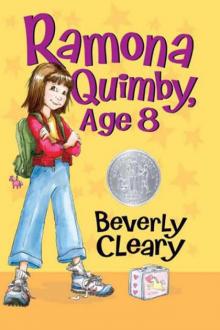 Ramona Quimby, Age 8
Ramona Quimby, Age 8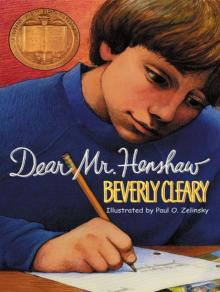 Dear Mr. Henshaw
Dear Mr. Henshaw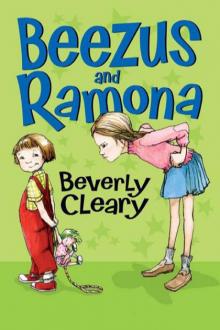 Beezus and Ramona
Beezus and Ramona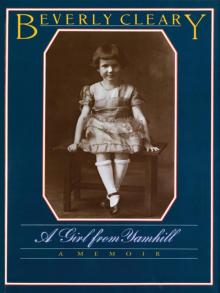 A Girl from Yamhill
A Girl from Yamhill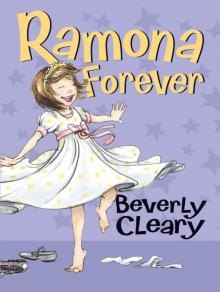 Ramona Forever
Ramona Forever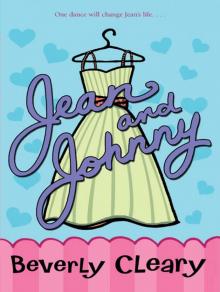 Jean and Johnny
Jean and Johnny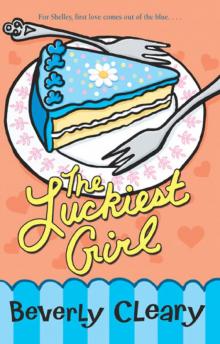 The Luckiest Girl
The Luckiest Girl Emily's Runaway Imagination
Emily's Runaway Imagination Ribsy
Ribsy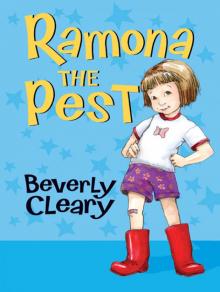 Ramona the Pest
Ramona the Pest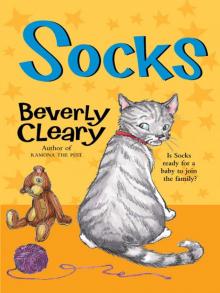 Socks
Socks Ramona's World
Ramona's World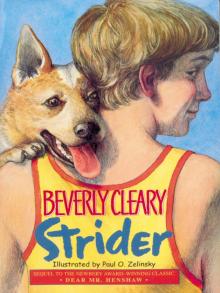 Strider
Strider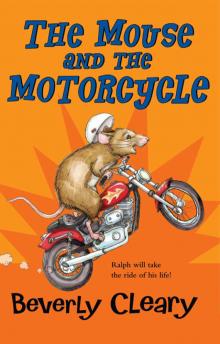 The Mouse and the Motorcycle
The Mouse and the Motorcycle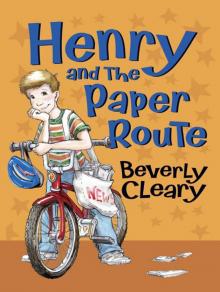 Henry and the Paper Route
Henry and the Paper Route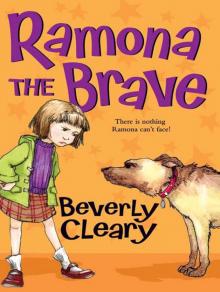 Ramona the Brave
Ramona the Brave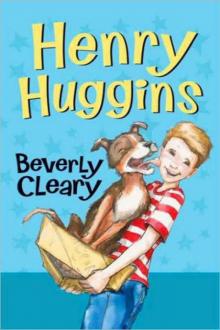 Henry Huggins
Henry Huggins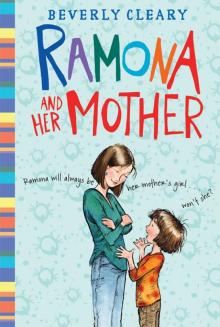 Ramona and Her Mother
Ramona and Her Mother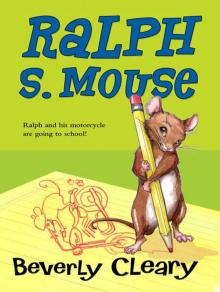 Ralph S. Mouse
Ralph S. Mouse Sister of the Bride
Sister of the Bride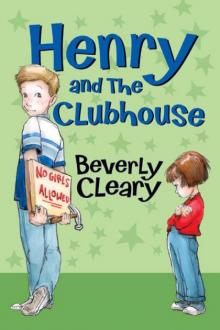 Henry and the Clubhouse
Henry and the Clubhouse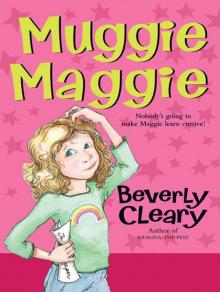 Muggie Maggie
Muggie Maggie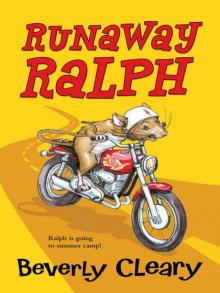 Runaway Ralph
Runaway Ralph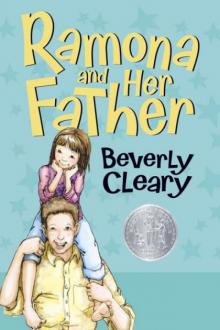 Ramona and Her Father
Ramona and Her Father Henry and Ribsy
Henry and Ribsy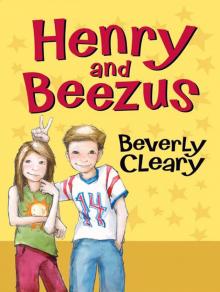 Henry and Beezus
Henry and Beezus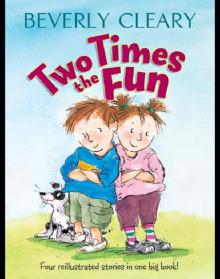 Two Times the Fun
Two Times the Fun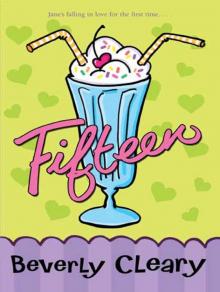 Fifteen
Fifteen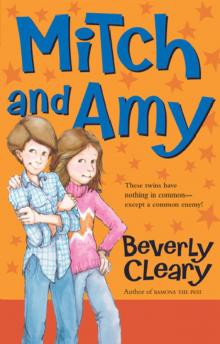 Mitch and Amy
Mitch and Amy